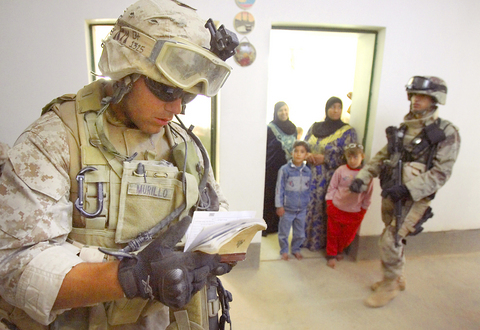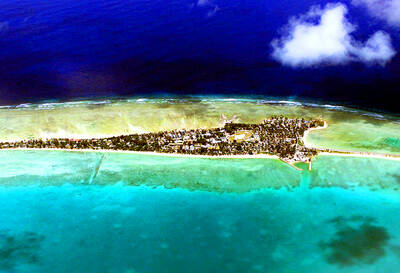Ten US Marines were killed by an Iraqi bomb in one of the bloodiest incidents of the war for Americans, a day after US President George W. Bush laid out a strategy he said would defeat the insurgency.
And in a videotape message shown on Friday, Iraqi insurgents holding four Western hostages threatened to kill them if Iraqi detainees are not released by Dec. 8.
Thursday's attack on the Marines, two weeks before Iraqis vote for a new parliament, struck a foot patrol near Fallujah. Eleven Marines were wounded by an improvised explosive device (IED), the military said on Friday.

PHOTO: AP
"The patrol was attacked with an IED fashioned from several large artillery shells," the Marines said.
Seven of the wounded had returned to active duty.
US commanders have expressed concern in recent months at the increasing use of more powerful and sophisticated roadside bombs. The high death toll on Thursday indicated an extremely powerful blast.
Typically, US troops keep themselves well spaced out when on foot patrols to avoid the risk of mass casualties.
Local officials in Fallujah said they were aware of a bomb attack on US troops overnight near Amiriya, 30km south of Fallujah. US officials declined further comment, however, and it was unclear if this was the same incident.
In August, 14 Marines were killed when a landmine destroyed their armored vehicle near Haditha in western Iraq. Other heavy tolls have been inflicted on Americans when helicopters have been brought down and when a suicide bomber devastated a US army mess hall last December in Mosul, killing 21 people.
Fallujah was the site of the biggest battle since US forces toppled former Iraqi president Saddam Hussein in April 2003 -- dozens of troops and hundreds of Iraqis were killed in the city, 50km west of Baghdad in November last year.
Since then Fallujah has been relatively quiet but the wider province of Anbar, comprising much of Iraq's western desert, has remained a stronghold of Sunni Arab groups opposed to the occupation and the Shiite-led government it helped install.
Some guerrilla forces are loyal to the Islamist goals of al-Qaeda and the movement's appointed leader in Iraq, Jordanian Abu Musab al-Zarqawi, but many are more secular in outlook and owe loyalties principally to tribal or nationalist leaders or to Saddam's Sunni-dominated Baath party, now outlawed.
Arabic television station Al Jazeera showed a tape of what it said were two Canadian hostages receiving food from their captors. An American and a Briton were shown speaking in what the channel said was a call for detainees to be released.
It was not possible to hear what the men were saying.
"They gave those concerned with the hostages until the 8th of this month before killing them if their demands are not met," the Arabic broadcaster said.
The four, seized in Baghdad, are members of the peace and humanitarian organization Christian Peacemaker Teams, one of the few remaining aid groups operating in Iraq.
Canadian Prime Minister Paul Martin called the threat "a callous act of terror against innocent people."
A State Department official strongly condemned the actions of those holding the humanitarian workers.
"We call for their immediate and unconditional release and for the release of all hostages in Iraq," said the official, who asked not to be named.
Separately, the mother and sister of a German woman, Susanne Osthoff, taken hostage in Iraq called on her kidnappers to show mercy and release her in an appeal shown on Al Jazeera.
More than 100 foreigners have been seized by insurgents in Iraq in the past two years. Some kidnappers demanded foreign forces quit Iraq, others sought ransoms and some both.
In Ramadi, Anbar's regional capital to the west of Fallujah, about 500 US and Iraqi troops launched an operation they said was designed to disrupt guerrilla activity before the election.
Insurgents staged a show of force in the city on Thursday, firing mortar rounds near a US base and official buildings. Letting themselves be filmed by news cameramen, masked men wielding rifles and grenade launchers distributed leaflets saying al-Qaeda was in charge of the town.
Within hours, however, the gunmen had gone from the streets and there was no sign of them on Friday.
Bush and his Republican Party are under pressure at home over the rising American death toll -- which the Pentagon put at 2,125 on Friday -- and the president has embarked on a new series of speeches aimed at shoring up support for a project which he says will bring peace and democracy to Iraq through an election on Dec. 15.
Faced with widespread resentment among Iraqis at the US presence and mounting calls in the US to bring the soldiers home, Bush said on Wednesday he would set no timetable for the withdrawal of the 160,000 or so US troops.
"I will settle for nothing less than complete victory," he said, adding that some reduction in troop levels might be possible as Iraqi security forces assumed a bigger role.
Meanwhile, four more US soldiers have died in Iraq, including a marine in the restive town of Ramadi, the Pentagon announced yesterday
During the latest anti-insurgent operation in Ramadi, a soldier died of wounds sustained when a rocket struck his vehicle on Thursday.
The city 110km west of Baghdad was the scene of rebel action on Thursday but the US command minimized the seriousness of the appearance of armed men in broad daylight, saying it was a largely symbolic action for propaganda purposes.
On Friday, three soldiers died in a car accident in Balad, north of Baghdad.

DISASTER: The Bangladesh Meteorological Department recorded a magnitude 5.7 and tremors reached as far as Kolkata, India, more than 300km away from the epicenter A powerful earthquake struck Bangladesh yesterday outside the crowded capital, Dhaka, killing at least five people and injuring about a hundred, the government said. The magnitude 5.5 quake struck at 10:38am near Narsingdi, Bangladesh, about 33km from Dhaka, the US Geological Survey (USGS) said. The earthquake sparked fear and chaos with many in the Muslim-majority nation of 170 million people at home on their day off. AFP reporters in Dhaka said they saw people weeping in the streets while others appeared shocked. Bangladesh Interim Leader Muhammad Yunus expressed his “deep shock and sorrow over the news of casualties in various districts.” At least five people,

ON THE LAM: The Brazilian Supreme Court said that the former president tried to burn his ankle monitor off as part of an attempt to orchestrate his escape from Brazil Former Brazilian president Jair Bolsonaro — under house arrest while he appeals a conviction for a foiled coup attempt — was taken into custody on Saturday after the Brazilian Supreme Court deemed him a high flight risk. The court said the far-right firebrand — who was sentenced to 27 years in prison over a scheme to stop Brazilian President Luiz Inacio Lula da Silva from taking office after the 2022 elections — had attempted to disable his ankle monitor to flee. Supreme Court judge Alexandre de Moraes said Bolsonaro’s detention was a preventive measure as final appeals play out. In a video made

It is one of the world’s most famous unsolved codes whose answer could sell for a fortune — but two US friends say they have already found the secret hidden by Kryptos. The S-shaped copper sculpture has baffled cryptography enthusiasts since its 1990 installation on the grounds of the CIA headquarters in Virginia, with three of its four messages deciphered so far. Yet K4, the final passage, has kept codebreakers scratching their heads. Sculptor Jim Sanborn, 80, has been so overwhelmed by guesses that he started charging US$50 for each response. Sanborn in August announced he would auction the 97-character solution to K4

SHOW OF FORCE: The US has held nine multilateral drills near Guam in the past four months, which Australia said was important to deter coercion in the region Five Chinese research vessels, including ships used for space and missile tracking and underwater mapping, were active in the northwest Pacific last month, as the US stepped up military exercises, data compiled by a Guam-based group shows. Rapid militarization in the northern Pacific gets insufficient attention, the Pacific Center for Island Security said, adding that it makes island populations a potential target in any great-power conflict. “If you look at the number of US and bilateral and multilateral exercises, there is a lot of activity,” Leland Bettis, the director of the group that seeks to flag regional security risks, said in an